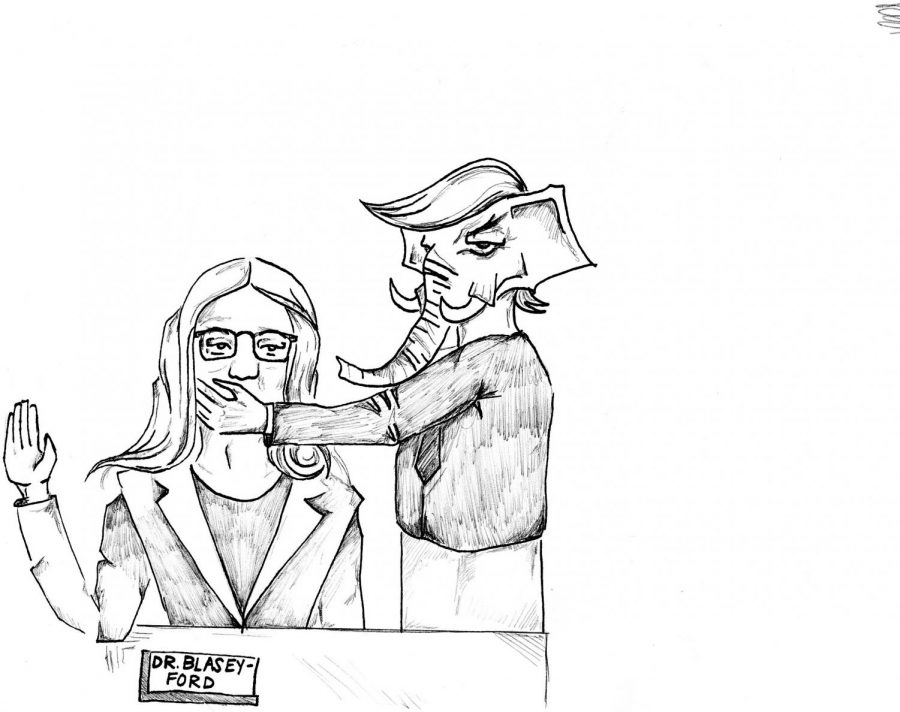Kavanaugh appointment reflects perils of partisan divide
November 13, 2018
The appointment of Brett Kavanaugh was not a decision made in the best interests of the people, but rather a power play in the long-running, bipartisan turf war that has engulfed Washington in a mire of distrust and petty arguments. This battle for power, accelerated by the Trump administration, has eclipsed the purpose of our elected officials: to serve us, the people, and instead has jeopardized the very values that we hold as a nation.
By no means is Kavanaugh underqualified to serve as a judge. He clerked at the Supreme Court before joining the Office of Independent Counsel (OIC), where he was the main author of The Starr Report, which detailed the OIC’s findings from their Bill Clinton impeachment investigation. In 2003, he was nominated for the Washington D.C. Court of Appeals by President Bush, but his appointment was fought for three years in another nasty partisan battle.
The allegations that surfaced during his Supreme Court nomination should have been enough to at least call into question his nomination. Christine Blasey-Ford’s testimony was difficult to listen to, making me wonder how much worse it must have been to live it. She detailed how Kavanaugh pinned her down and how she managed to escape. She explained how it affected her life after and how she was too afraid to talk about it until a couples’ therapy session in 2012.
Unsurprisingly, Blasey-Ford was criticized and discredited for failing to report the attack after it happened. Well, who would? She stepped forward because she felt it was her civic duty to shed light on the past of a future Supreme Court Justice, only to be ridiculed by many on the right, with President Donald Trump joining in: “I have no doubt that, if the attack on Dr. Ford was as bad as she says, charges would have been immediately filed with local law enforcement authorities,” Trump tweeted.
Perhaps I might be more forgiving towards the Kavanaugh nomination and subsequent events if not for the failed nomination of Merrick Garland. After the death of Antonin Scalia in 2016, President Obama nominated Garland to fill the spot. With Republicans holding the Senate majority, they stalled a vote on his nomination for 293 days until Congress was adjourned, which effectively ended his nomination and led to the nomination of Neil Gorsuch after the 2016 presidential election.
If examining sexual assault claims against a possible Supreme Court Justice is wrong, we have our priorities wrong as a nation. I love my country, but I’m not afraid to admit when it’s wrong. Kavanaugh shouldn’t have been appointed, plain and simple. Yes, people change, and what he was accused of doing was decades ago, but any question of character in the context of a Supreme Court nomination deserves to be seen to completion, though the FBI was only able to interview a few former classmates and a second accuser before Kavanaugh was confirmed.
The circus that was made out of Blasey-Ford’s recollection of a harrowing personal experience was done almost exclusively for the sake of grabbing power on the Supreme Court, a side effect of growing contempt between left and right. As a country, we need to learn how to set aside our views from what’s right. We have been steered in a direction where it’s no longer encouraged to have conversations and try to understand each other’s views.
In the spirit of political dialogue and minimizing bias, I can see that Kavanaugh has been a dedicated public servant, choosing government jobs over high-paying private firms and garnering respect from well-regarded colleagues, but I can also acknowledge that there is a question of character that remains unresolved, even as Kavanaugh sits on the Supreme Court today. This is not an isolated incident either; this is a part of a pattern of disregard for women under the Trump administration, one with a trail that will be seen for decades to come.










